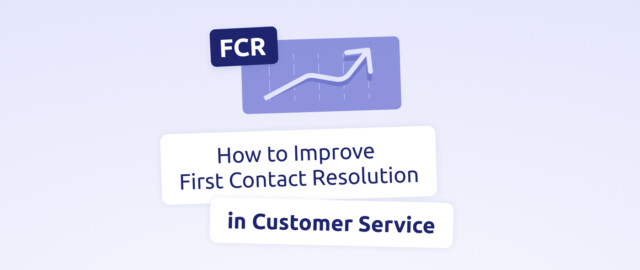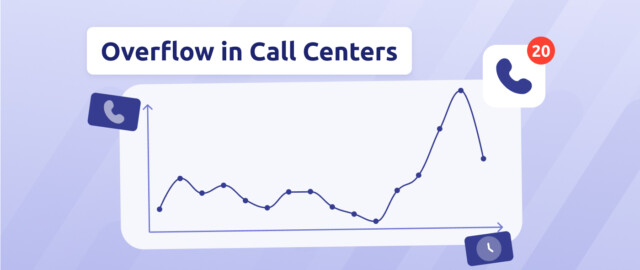Omnichannel Customer Service: A Strategic Priority for Your Business
Omnichannel customer service is no longer optional—it’s a necessity for businesses that prioritize customer satisfaction. Today’s consumers expect a consistent experience regardless of the channel they use to interact with a brand. They want to switch from one channel to another seamlessly, without having to repeat their issue.
For businesses, this shift brings major challenges.
Each channel has its own rules—from communication styles to response time expectations. For example, phone interactions demand immediate answers and a more formal tone, while chatbots allow for quick, direct, and often fragmented conversations. Social media, on the other hand, requires rapid responses and a high level of empathy, especially when managing customer complaints.
As a result, customer interactions are becoming increasingly complex.
Agents must constantly switch between channels, adapt their communication, and coordinate responses—while handling increasingly well-informed and demanding customers. In this environment, delivering a seamless omnichannel CX can be difficult.
Yet, getting it wrong comes at a cost. Poor omnichannel customer support can lead to frustration, inconsistencies in responses, and a sense of being unheard—pushing customers toward dissatisfaction, disengagement, and ultimately, churn.
On the flip side, a well-executed omnichannel strategy builds trust and strengthens customer loyalty.
Providing a seamless omnichannel customer experience starts with comprehensive call center training for your frontline teams.
The Importance of Coaching in an Omnichannel Strategy
Businesses must focus on developing their agents’ adaptability and versatility. This is where coaching plays a crucial role. Through hands-on experience and real-time feedback, agents can build the right reflexes to manage interactions efficiently.
Coaching helps agents master the nuances of each communication channel—whether it’s phone, email, social media, or chat—ensuring they deliver an optimal omnichannel customer experience at every touchpoint.
This is best achieved through real-life scenarios, where agents handle diverse customer requests, such as inquiries, complaints, or technical support.
A coach’s role is essential in this process. By observing how an agent navigates these interactions, they can identify strengths and areas for improvement:
- How well does the agent adapt to different customer contexts?
- Is their tone appropriate for the expected level of formality?
- Can they manage multiple interactions at once without compromising service quality?
Based on these observations, the coach provides personalized guidance to help agents become more confident and effective. For example, they may offer techniques to make chat interactions more engaging, personalize emails, or reassure a frustrated customer over the phone.
The goal is for agents to adjust their communication style based on the context and business objectives—while embodying the brand’s values.
Of course, this transformation doesn’t happen overnight.
It requires ongoing coaching and continuous practice to help agents refine their expertise across different channels, whether phone, social media, or email. This is why implementing a structured, long-term coaching program is critical.
The benefits of such an approach are significant:
- Agents become more confident and autonomous, as they are better equipped to handle diverse customer inquiries.
- They develop valuable communication skills that will benefit them throughout their careers.
- Most importantly, they feel more engaged, knowing they are supported and valued in their roles.
Ultimately, coaching is the cornerstone of a successful omnichannel customer service strategy.

3 Key Areas of Call Center Training for Omnichannel Success
Coaching alone is not enough. To be truly effective, it must be built on a foundation of high-quality call center training that equips agents with the right skills.
Here are three key training areas to strengthen omnichannel customer support and drive long-term success.
1. Understanding Customer Expectations Across Channels
Each channel comes with specific customer expectations regarding response time, personalization, and communication style.
For example, on social media, customers expect quick and empathetic responses, while email interactions allow for a longer response time and a more formal tone.
To deliver a consistent omnichannel customer experience, agents must master the unique characteristics of each channel and adjust their communication accordingly. Call center training should help them identify key markers for each channel, such as:
- Appropriate tone and language level
- Message formatting
- Level of interactivity expected
By learning to adapt to these nuances, agents can provide a more cohesive and satisfying customer experience across all touchpoints.
2. Mastering Customer Service Technology
Today, delivering effective omnichannel customer support requires more than just communication skills—it demands technological proficiency.
Beyond best practices, agents must be fully trained in using contact center solutions, including CRM systems, live chat, helpdesk platforms, and omnichannel communication tools. A well-structured, ongoing training program ensures that agents can maximize the potential of these tools.
Technology is constantly evolving. Diabolocom, for instance, regularly enhances its platform with AI-powered features such as:
- Virtual Agents or Voicebots for automated customer interactions
- Call transcription and analytics to improve response quality
- AI-driven insights to optimize customer interactions
To fully leverage these innovations, agents need continuous training to stay ahead of technological advancements and deliver top-tier service.
3. Developing a Culture of Responsiveness and Consistency
The final pillar of effective contact center agent training is fostering a mindset of responsiveness and consistency.
Beyond mastering tools and communication channels, agents must understand that every customer—regardless of the channel they use—expects a fast, personalized response.
This requires a proactive approach, where agents seek out information rather than waiting for it to come to them. It also involves attention to detail and precision, ensuring there are no inconsistencies when switching between channels.
Training should include:
- Prioritization exercises to manage multiple customer inquiries efficiently
- Information retrieval drills to find accurate answers quickly
- Multitasking techniques to handle requests across different channels simultaneously
The goal is to equip agents with the skills they need to balance speed and service quality, enhancing both their efficiency and the overall omnichannel customer experience.
The Impact of Coaching and Training on Agent Performance
Investing in call center training and coaching is an investment in better omnichannel customer service.
These initiatives drive two major benefits:
Improved Customer Satisfaction

This is the most immediate and visible outcome. Well-trained agents can provide fast, relevant responses across all channels, aligning with customer expectations.
They know how to adapt their communication based on the customer’s needs, personalizing interactions to build meaningful relationships.
As a result, customers feel heard, understood, and valued, strengthening their connection to the brand and increasing long-term loyalty.
Increased Agent Engagement and Retention
The benefits of call center training and coaching extend beyond customer satisfaction—they also have a direct impact on agent engagement and retention.
When agents receive continuous support and skill development, they feel more confident and autonomous in their roles. Knowing their work is valued and recognized boosts motivation and job satisfaction. This creates a positive cycle where agents feel empowered, leading to higher retention and long-term commitment.
This virtuous cycle is reflected in key operational metrics. With better training, agents handle requests more efficiently. First-call resolution rates improve, which naturally reduces handling times and increases productivity.
Advanced quality monitoring tools, such as Diabolocom’s Quality Monitoring, allow businesses to track these improvements. By leveraging AI to analyze 100% of calls, compared to just 0.3% with manual reviews, Quality Monitoring provides a comprehensive view of service quality. This data is invaluable for fine-tuning training programs and measuring their long-term impact.
Conclusion
The success of omnichannel customer service ultimately depends on agent training and coaching.
For businesses, investing in contact center agent training should be a top priority. Continuous training and coaching initiatives help agents develop versatility, master customer interactions, and cultivate a strong service mindset.
Beyond improving customer experience, training programs also elevate the role of customer service agents, a profession often seen as demanding and stressful. When agents are equipped with the right skills, they become more efficient, build authentic connections with customers, and find greater satisfaction in their work—leading to higher engagement and lower turnover.
Of course, training and coaching alone aren’t enough. They must be part of a broader omnichannel strategy that integrates technology, tools, workflow optimization, and organizational adjustments.
One thing is certain: by putting people at the heart of your omnichannel customer service strategy, you create richer, more lasting relationships with your customers.
Curious to know more about Diabolocom?



